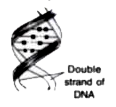Mention two differences between antibodies and interferons.
Step-by-Step Text Solution:
1. Definition and Origin:
- Antibodies: Antibodies are protein molecules produced by B lymphocytes (a type of white blood cell) in response to foreign antigens (pathogens). They circulate in the blood and lymphatic system.
- Interferons: Interferons are signaling proteins produced by virus-infected cells. They play a role in the immune response against viral infections.
2. Function:
- Antibodies: The primary function of antibodies is to specifically bind to foreign antigens, neutralizing pathogens and marking them for destruction by other immune cells.
- Interferons: Interferons help to protect neighboring cells from viral infection by inducing them to produce proteins that inhibit viral replication and translation.
3. Mechanism of Action:
- Antibodies: Antibodies directly target and neutralize specific pathogens or toxins.
- Interferons: Interferons act on adjacent uninfected cells to prepare them for potential viral attack, thereby limiting the spread of the virus.
4. Type of Response:
- Antibodies: They are part of the adaptive immune response, which is specific and has memory.
- Interferons: They are part of the innate immune response, which is non-specific and provides immediate defense against viral infections.
Differences Summary:
1. Antibodies are produced by B lymphocytes and target specific foreign antigens, while interferons are produced by virus-infected cells and act on neighboring cells to inhibit viral replication.
2. Antibodies are involved in the adaptive immune response, whereas interferons are part of the innate immune response.
---
- Antibodies: Antibodies are protein molecules produced by B lymphocytes (a type of white blood cell) in response to foreign antigens (pathogens). They circulate in the blood and lymphatic system.
- Interferons: Interferons are signaling proteins produced by virus-infected cells. They play a role in the immune response against viral infections.
- Antibodies: The primary function of antibodies is to specifically bind to foreign antigens, neutralizing pathogens and marking them for destruction by other immune cells.
- Interferons: Interferons help to protect neighboring cells from viral infection by inducing them to produce proteins that inhibit viral replication and translation.
- Antibodies: Antibodies directly target and neutralize specific pathogens or toxins.
- Interferons: Interferons act on adjacent uninfected cells to prepare them for potential viral attack, thereby limiting the spread of the virus.
- Antibodies: They are part of the adaptive immune response, which is specific and has memory.
- Interferons: They are part of the innate immune response, which is non-specific and provides immediate defense against viral infections.
1. Antibodies are produced by B lymphocytes and target specific foreign antigens, while interferons are produced by virus-infected cells and act on neighboring cells to inhibit viral replication.
2. Antibodies are involved in the adaptive immune response, whereas interferons are part of the innate immune response.
Topper's Solved these Questions
- HUMAN HEALTH AND DISEASE BOOK - ICSECHAPTER - HUMAN HEALTH AND DISEASE EXERCISE - PREVIOUS YEARS. BOARD PAPER QUESTIONS (Short Answer Type-II Questions)
12 Videos
- HUMAN HEALTH AND DISEASE BOOK - ICSECHAPTER - HUMAN HEALTH AND DISEASE EXERCISE - PREVIOUS YEARS. BOARD PAPER QUESTIONS (Long Answer Type Questions)
27 Videos
- HUMAN HEALTH AND DISEASE BOOK - ICSECHAPTER - HUMAN HEALTH AND DISEASE EXERCISE - PREVIOUS YEARS. BOARD PAPER QUESTIONS (Very Short Answer Type Questions)
23 Videos
- EVOLUTIONBOOK - ICSECHAPTER - EVOLUTIONEXERCISE - COMPETITION CORNER (Assertion and Reason Type Questions (For AIIMS aspirants))
26 Videos
- HUMAN REPRODUCTIONBOOK - ICSECHAPTER - HUMAN REPRODUCTIONEXERCISE - SOURCE BASED QUESTIONS
22 Videos
Similar Questions
Write two differences between: Antibodies and interferons
View SolutionGive three differences between antibodies and interferons .
View SolutionDefine interferons.
View SolutionInterferon is
View SolutionMention two differences between amylopectin and cellulose.
View SolutionGiven below is a diagram of a double helical structure of DNA.

Mention two points of difference between Mitosis and Meiosis.
View SolutionHow did Eli Lilly synthesis the human insulin ? Mention one difference between this insulin and the one produced by the human pancreas.
View SolutionWrite two differences between polypeptides and proteins.
View SolutionGive one significant difference between the following: Antibodies and Interferons
View SolutionList the difference between antigen and antibody .
View Solution
